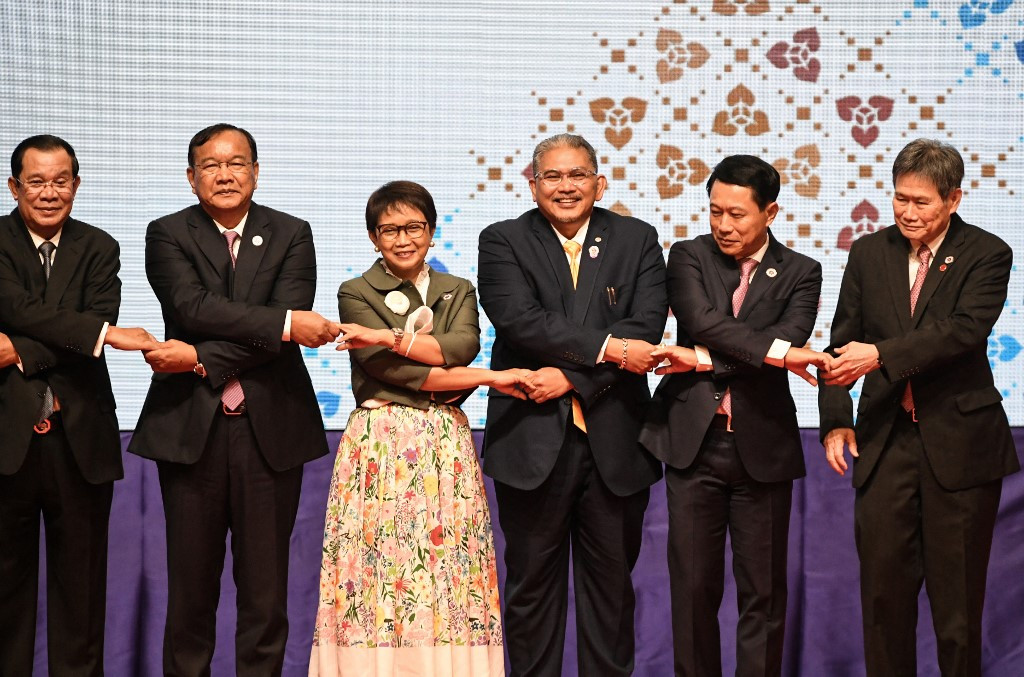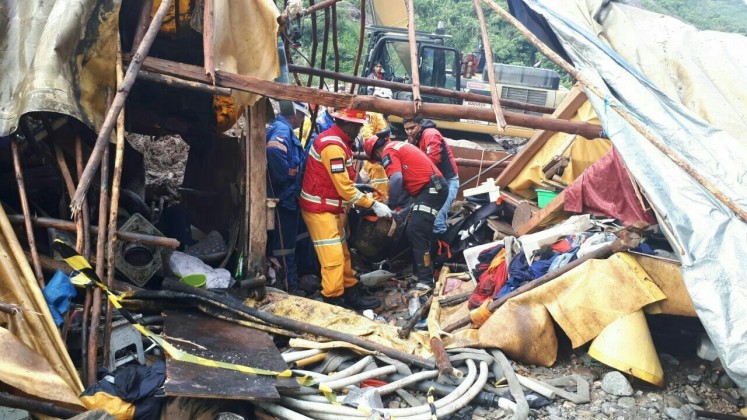ASEAN marks 55th year while RI gears up for chairmanship
ASEAN celebrated its 55th anniversary on Monday in Cambodia’s capital, Phnom Penh, amid “a time of great upheaval” as Indonesia braces itself for its upcoming role as the group’s chairman next year.
Change text size
Gift Premium Articles
to Anyone

A
SEAN celebrated its 55th anniversary on Monday in Cambodia’s capital, Phnom Penh, amid “a time of great upheaval” as Indonesia braces itself for its upcoming role as the group’s chairman next year. The 10-nation bloc, established in 1967 in Bangkok, has recently had its share of troubles with the ongoing superpower rivalry and the crisis in Myanmar.
Just last week at its Foreign Ministers’ Meeting (AMM), the group had to resort to an uncharacteristic strategy of calibrating warnings to Naypyidaw that it was open to making moves without Myanmar’s vote if no progress vis-a-vis the Five-Point Consensus peace initiative has been made by November. Heated internal debates among the nations concerning the idea of suspending the military-led country from future conferences were also reported to have taken place.
In his opening remarks at the commencement of the AMM, Prime Minister Hun Sen of Cambodia, which chairs ASEAN this year, noted that the “association has never before been confronted at the same time with so many perils”.
Indonesia, the bloc’s largest country and the next chair on the list, now gears up to play its role as a leader that will be faced with plenty of challenges.
Foreign Minister Retno LP Marsudi said, in her speech for ASEAN Day on Monday, that while ASEAN “has stood the test of time, [it] does not mean that it can [afford to be] complacent”.
“Looking back, I can confidently say that ASEAN is the best thing that [has] happened to our region. In fact, I could not imagine this region without ASEAN,” she said.
“At the same time, many regional flashpoints show signs of escalation and have the potential to turn into an open conflict. Internally, ASEAN is also challenged to find a solution as a family to address the crisis in Myanmar.”
The minister underlined the importance of the bloc’s charter, which stipulates allegiance to democracy, the rule of law and good governance. Amid a tumultuous geopolitical situation, Retno said that the anniversary was a “moment for resolution to strengthen ASEAN, to safeguard its credibility and retain its relevance”.
She added that under Indonesia’s leadership, the bloc would focus on three areas, namely the unity, centrality and the reliability of the bloc.
“In facing the complexities of today’s challenges, we already have a wealth of mechanisms under ASEAN including those we created with our partners,” the minister noted.
“This is what Indonesia will put forward in its chairmanship next year in 2023.”
Much-needed unity
The first decades of ASEAN, which was initially formed to ensure regional cooperation following a disagreement between Thailand and Indonesia, was colored by distrust and a lackluster esprit de corps. In the early 90s, Thanat Khoman recalled his experience as the serving Thai foreign minister in the year the regional bloc was formed.
“The most serious shortcoming [...] resides in the lack of political will, as well as the lack of trust and sincerity toward one another,” he wrote.
Fifty years later – despite improving camaraderie and the bloc’s progress in fortifying its foundations through the ASEAN Charter in 2007 and its subsequent affirmation of human rights, democracy and good governance – the time is nigh for the group to attest its commitment to unity, an expert says.
“As an institution, ASEAN has progressed considerably. But the criticism remains the same – how is it going to implement the principles written in its charter?” Lina Alexandra, senior international relations researcher at the Centre for Strategic and International Studies (CSIS), said on Tuesday.
Fifteen years after its charter was first proclaimed, the bloc still struggles to implement some of its most core values, she said. And, in solving this profound issue, solidifying the group’s unity was a paramount step in asserting ASEAN’s centrality, she added.
“The biggest challenge now is the commitment to ASEAN unity,” she said. “Each of the member states needs to reflect on the matter.”
Updating the charter to better fit today’s geopolitical and security issues would prove useful, alongside a mechanism to operationalize investigation, fact-finding guidelines and sanctions, she said, or else, ASEAN might risk irrelevance in the future.
“There is a lot of homework to which the group needs to pay attention, especially in practical matters. It has to be concrete,” she noted.
“All member states need to ask themselves, what is the meaning of being in ASEAN? National interests aside, there are collective issues to be addressed. After all, we are all members of the same crew.”









